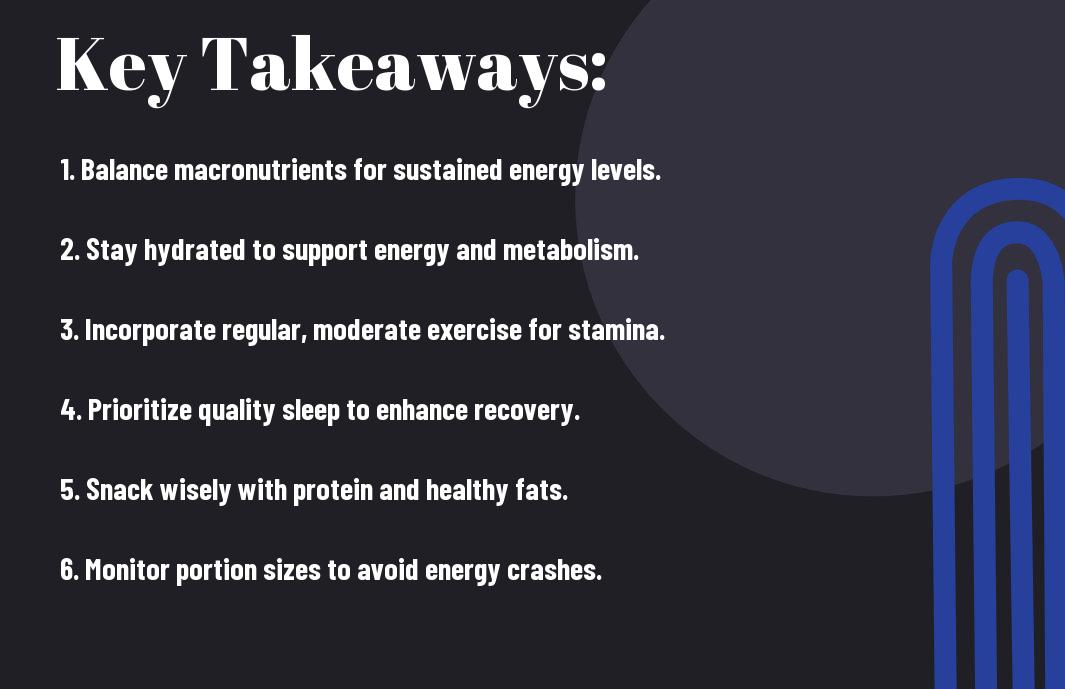It’s common to experience energy dips when you’re losing weight, which can make it challenging to stay on track with your fitness goals. Understanding the reasons behind these fluctuations and adopting effective solutions can help you maintain your energy levels throughout your weight loss journey. In this blog post, you’ll discover practical tips and strategies designed to boost your vitality, ensuring that you feel your best while achieving your desired results. Let’s explore how you can overcome these energy challenges and enhance your overall well-being during your transformation.

Key Takeaways:
- Balanced Meals: Incorporate a mix of proteins, healthy fats, and complex carbohydrates to maintain steady energy levels.
- Hydration: Stay well-hydrated, as dehydration can lead to fatigue. Aim for at least 8 glasses of water daily.
- Regular Snacks: Opt for nutritious snacks between meals to prevent energy dips, such as fruits, nuts, or yogurt.
- Quality Sleep: Ensure you get sufficient rest each night, as sleep is vital for recovery and energy maintenance.
- Moderate Exercise: Engage in regular physical activity, but avoid overtraining, which can lead to exhaustion.
- Mindful Eating: Pay attention to portion sizes and meal timings to avoid energy crashes caused by overeating or skipping meals.
- Stress Management: Implement relaxation techniques such as yoga or meditation to help maintain emotional stability and energy levels.
Understanding Energy Dips
For many individuals launching on a weight loss journey, experiencing energy dips can be a common challenge. These dips often manifest as feelings of fatigue or lethargy, which can hinder your motivation and progress. It’s important to comprehend the factors contributing to these fluctuations in energy levels so you can take proactive steps to manage them effectively.
Causes of Energy Dips During Weight Loss
Against popular belief, energy dips during weight loss are not solely due to calorie restriction. Changes in metabolism, variations in exercise intensity, and adjustments in your eating patterns can all play a role. Additionally, psychological factors, such as stress and anxiety related to weight loss goals, may further contribute to these energy fluctuations.
The Role of Nutrient Deficiency
With a focus on reducing calorie intake, you may inadvertently limit important nutrients that fuel your body. Nutrient deficiencies can significantly impact your energy levels, leading to unexpected fatigue and a lack of motivation. It’s important to be aware of your nutritional intake to ensure your body receives the vitamins and minerals it needs to sustain energy levels effectively.
Dips in energy from nutrient deficiencies often stem from inadequate consumption of vital nutrients like iron, B vitamins, and magnesium. Iron supports oxygen transport in your blood, while B vitamins are important for energy production at the cellular level. Magnesium contributes to muscle function and energy metabolism. By ensuring a balanced diet rich in these nutrients, you can help mitigate energy dips and support your overall well-being during weight loss.


Nutritional Strategies
Assuming you are on a weight loss journey, implementing nutritional strategies can significantly help maintain your energy levels. Focus on incorporating a variety of foods that support your weight loss goals while keeping fatigue at bay. A balanced diet filled with whole foods will provide the necessary nutrients your body needs for optimal function, enabling you to stay energized throughout the day.
Balanced Macronutrient Intake
Against the common trend of low-carb diets, it’s important to maintain a balanced intake of macronutrients: carbohydrates, proteins, and fats. Each plays a unique role in sustaining your energy levels. By consuming the right proportions of these macronutrients, you can support your metabolism, muscle maintenance, and overall health, which can help reduce energy dips as you lose weight.
Importance of Hydration
Balanced hydration is often overlooked but plays a significant role in your energy levels during weight loss. Dehydration can lead to fatigue, decreased concentration, and impaired physical performance, which can hinder your weight loss progress. Ensuring you drink adequate water throughout the day will help sustain your energy and keep your body functioning optimally.
To maintain hydration, target drinking at least half your body weight in ounces of water daily, adjusting for activity level and climate. Incorporating hydrating foods like fruits and vegetables also enhances your fluid intake. By prioritizing hydration, you’ll experience improved energy levels, which can aid in your workout performance and overall well-being during your weight loss journey.
Meal Timing and Frequency
Not every meal is created equal. You should pay attention to when you eat, as meal timing can affect your energy levels and overall metabolism. Consuming balanced meals at regular intervals helps maintain stable blood sugar levels, preventing those dreaded energy dips while you’re losing weight. Aim for three main meals and a couple of healthy snacks to keep your energy steady throughout the day.
The Impact of Eating Patterns
Among the factors influencing your energy levels during weight loss, your eating patterns play a significant role. Adopting a consistent eating schedule can help your body adapt and optimize nutrient absorption, leading to better energy management. Dividing your meals into smaller, frequent portions may also keep your metabolism active, preventing crashes in energy.
Snacking Smartly
Snacking can be a helpful strategy when you’re focused on losing weight. Smart snacking means choosing nutrient-dense foods that provide energy without excess calories. Opt for snacks high in protein, healthy fats, and fiber, as they can stabilize blood sugar and keep you feeling full longer. Examples include nuts, Greek yogurt, or raw veggies paired with hummus.
Indeed, snacking smartly can make a significant difference in how you feel throughout the day. By carefully selecting your snacks, you can maintain your energy levels without derailing your weight loss efforts. Incorporate snacks that satisfy hunger and provide lasting energy. This will help you stay on track while preventing unhealthy cravings and avoid large meal gaps that could lead to overeating later.
Physical Activity Considerations
Keep your physical activity balanced to manage energy dips during your weight loss journey. Engaging in regular exercise can boost your mood and energy levels, but be mindful of how your body feels. Consider finding techniques to cope with fatigue, such as those discussed in How to Manage Diet Fatigue and Stress. Tailoring your workouts to your energy levels can make all the difference in sustainable weight loss.
Exercise and Energy Levels
Across various types of workouts, it’s imperative to listen to your body. Low-energy days might call for lighter activities like walking or yoga instead of high-intensity training. Adjusting your exercise routine to mindfully respond to your energy can help maintain motivation without compromising your progress.
Incorporating Rest and Recovery
After intense workouts, your body needs time to rebuild and recharge. Prioritizing rest is just as important as the workouts themselves. You may find that integrating active recovery days—like gentle stretching or leisurely walks—can support your overall well-being and enhance performance.
Recovery plays a vital role in your overall fitness and energy management. By allowing your body to rest, you’re not only preventing burnout but also facilitating muscle repair and growth. Incorporating strategies such as proper sleep, hydration, and nutrition can help you restore your energy levels and readiness for your next workout session.
Mind-Body Techniques
After adopting nutritious eating habits and regular exercise, it’s important to incorporate mind-body techniques into your routine. Engaging in practices like yoga, meditation, or deep breathing can significantly enhance your energy levels, improve mental clarity, and support your weight loss journey. By nurturing the connection between your mind and body, you can better manage cravings and maintain motivation, leading to more sustainable results.
Stress Management and Energy
One of the keys to maintaining your energy while losing weight is effective stress management. High stress levels can lead to fatigue and emotional eating, making it harder for you to stay on track. Techniques such as progressive muscle relaxation or journaling can help you alleviate stress, allowing for a more energized and focused approach to your weight loss plan.
The Benefits of Mindfulness
Along with stress management, practicing mindfulness can drastically improve your energy levels and overall well-being. By being present in the moment and fully aware of your thoughts and feelings, you create a sense of peace that can counteract fatigue and anxiety. Mindfulness allows you to make healthier choices and appreciate your efforts, making it easier to stay motivated during your weight loss journey.
Even incorporating just a few minutes of mindfulness into your daily routine can lead to significant benefits. By focusing on your breath and thoughts, you cultivate a greater sense of awareness, enabling you to better manage stress triggers and prevent emotional eating. This practice helps you to connect with your body, promoting a positive mindset that can energize you and enhance your commitment to your weight loss goals.

Supplements and Supportive Strategies
Many individuals experience energy dips while losing weight; incorporating appropriate supplements and supportive strategies can help maintain your vitality. Consider exploring resources like Overcoming Your Midafternoon Energy Slump to identify lifestyle changes and nutritional interventions that can enhance your energy levels throughout the day.
Evidence-Based Supplement Options
Besides adjusting your diet, certain evidence-based supplements can aid in combating fatigue. Options like B vitamins, magnesium, and caffeine can effectively support your energy levels; however, it’s important to choose supplements that align with your specific needs and goals.
Consulting Healthcare Professionals
Along your weight loss journey, consulting healthcare professionals can provide personalized guidance tailored to your unique health situation. They can help assess your current nutritional intake, recommend appropriate supplements, and ensure that your energy levels remain steady during your weight loss efforts.
Healthcare professionals can offer valuable insights into your overall health and wellness, ensuring that you’re not only losing weight but also feeling your best. They may suggest specific tests to identify deficiencies or imbalances that could be contributing to your energy dips. By working with professionals, you can create a comprehensive plan that incorporates both dietary changes and supplementation strategies, leading to a more sustainable and effective weight loss journey.
Conclusion
Taking this into account, managing energy dips while losing weight involves a proactive approach to nutrition and lifestyle. You can enhance your energy levels by incorporating balanced meals that include protein, healthy fats, and complex carbohydrates. Staying hydrated and engaging in regular physical activity will also help maintain your stamina. Don’t forget to prioritize rest and recovery, as adequate sleep plays a vital role in your overall well-being. By implementing these strategies, you can sustain your energy throughout your weight loss journey and achieve your goals effectively.
FAQ on Solutions for Energy Dips While Losing Weight
Q: What are some common causes of energy dips when losing weight?
A: Energy dips during weight loss can be caused by several factors, including a reduced caloric intake, insufficient nutrient intake, dehydration, and a lack of adequate sleep. Additionally, engaging in high-intensity workouts without proper recovery can also lead to fatigue.
Q: How can I balance my diet to maintain energy levels while losing weight?
A: To maintain energy levels, focus on a balanced diet that includes adequate amounts of lean proteins, healthy fats, and whole carbohydrates. Fiber-rich foods like fruits, vegetables, and whole grains can provide sustained energy. Including small, frequent meals instead of large ones may also help stabilize energy levels throughout the day.
Q: What role does hydration play in preventing energy dips?
A: Staying hydrated is imperative for maintaining energy levels. Dehydration can lead to fatigue, decreased concentration, and reduced physical performance. Aim to drink enough water throughout the day, adjusting your intake based on your activity level and the climate you are in.
Q: How can I improve my sleep to combat energy dips during weight loss?
A: Quality sleep is key for overall well-being and energy management. Aim for 7-9 hours of sleep per night. Establish a consistent sleep schedule, create a relaxing bedtime routine, and limit exposure to screens before bed. Ensuring a comfortable sleep environment can also help improve sleep quality.
Q: Are there any specific exercises that can help boost energy levels during weight loss?
A: Incorporating a mix of aerobic exercises and strength training can help enhance energy levels. Activities like brisk walking, cycling, and swimming can increase cardiovascular fitness, while strength training helps in building muscle mass, which can improve metabolism. Including activities you enjoy will also keep you motivated and energized.
Q: What are some healthy snacks that can help boost my energy during weight loss?
A: Healthy snacks can provide quick energy boosts. Options include nuts, yogurt, fruit, or whole-grain toast with nut butter. You can also try veggie sticks with hummus or hard-boiled eggs. These snacks are nutrient-dense and can help keep energy levels stable between meals.
Q: Should I consider supplements to combat energy dips when losing weight?
A: While a well-balanced diet is the best source of nutrients, certain supplements may help if you find it challenging to meet your needs through food alone. Vitamins such as B12, iron, and magnesium can support energy levels. It’s advisable to consult a healthcare professional before starting any supplements to ensure they’re appropriate for your individual circumstances.




